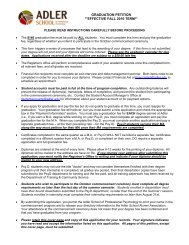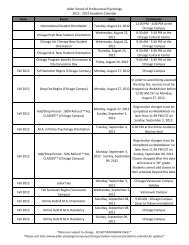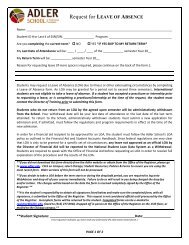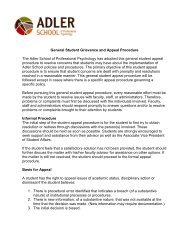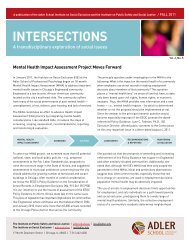Adler School of Professional Psychology Catalog 2008 – 2009
Adler School of Professional Psychology Catalog 2008 – 2009
Adler School of Professional Psychology Catalog 2008 – 2009
Create successful ePaper yourself
Turn your PDF publications into a flip-book with our unique Google optimized e-Paper software.
emphasis will include trauma and children, behavioral and learning problems<br />
associated with conditions <strong>of</strong> disadvantage and traumatizing environments,<br />
diversity issues, advocacy, negotiating social service, and educational systems<br />
that deal with children.<br />
685 Child and Adolescent Cognitive-Behavior Therapy 3 Credits<br />
This course introduces students to the theory and practice <strong>of</strong> cognitive-behavior<br />
therapy (CBT) with children, adolescents and families. The course focuses on<br />
learning theory, treatment planning, CBT case conceptualization, and<br />
empirically-validated treatments for youth with internalizing and externalizing<br />
disorders. Developmental psychology is used as a guiding framework for<br />
understanding the practice <strong>of</strong> CBT with children and adolescents.<br />
690 Supervision and Consultation 3 Credits<br />
This course intended to occur late in the doctoral curriculum, during or just<br />
before the internship, focuses primarily on clinical supervision, with secondary<br />
focus on clinical and programmatic consultation. It provides an overview <strong>of</strong> all<br />
dimensions <strong>of</strong> supervision, including the supervisory contract, theoretical<br />
models <strong>of</strong> supervision, the supervisory relationship, issues <strong>of</strong> diversity, gender<br />
and power, supervisory modalities, developmental issues, and ethical and legal<br />
issues. The course includes an optional laboratory in which students who do not<br />
have current supervisory responsibilities can arrange to have quasi-supervisory<br />
responsibility for students in lower-level intervention courses.<br />
691 Public Policy, Advocacy, and Social Change 3 Credits<br />
This course is designed to focus on the analysis, formulation, and advocacy <strong>of</strong><br />
public policy within the context <strong>of</strong> public administration, community organizing<br />
and the policy making process. It identifies methods for understanding the<br />
political process as a system and looks at evaluation techniques to address<br />
complex policy issues. It examines ways psychologists, behavioral healthcare<br />
delivery systems, advocacy groups, and community organizations can work with<br />
local, state, tribal, and federal government to address issues <strong>of</strong> social change. It<br />
provides an overview <strong>of</strong> governmental structure, process, and policies at all<br />
levels. The course presents effective methods <strong>of</strong> communication, advocacy, and<br />
lobbying to challenge policy, promote concerns and address needs.<br />
692 The Role <strong>of</strong> Psychologists in Management, 3 Credits<br />
Administration, and Leadership<br />
This course focuses on the development <strong>of</strong> roles for psychologists in a variety<br />
<strong>of</strong> administrative and leadership roles including behavioral health care<br />
management, public administration, and educational leadership. It provides a<br />
foundation <strong>of</strong> motivation and understanding for leadership development by<br />
<strong>of</strong>fering theoretical background, practical information, and an opportunity for<br />
role modeling to encourage students to develop their organizational leadership<br />
130





